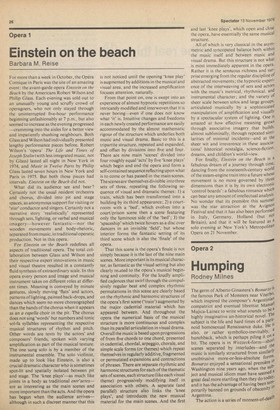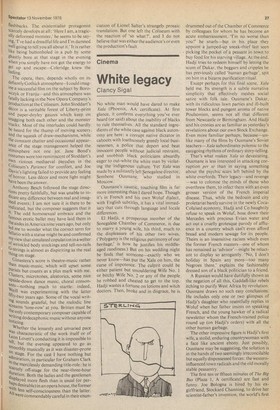Opera 2
Humping
Rodney Milnes
The germ of Alberto Ginastera's Bomarzo is the famous Park of Monsters near Viterbo, which inspired the composer's Argentinian compatriot and eventual librettist Manuel Mujica-Lainez to write what sounds to be a highly imaginative un-historical novel. The subject is the life and hard times of a pare' noid homosexual Renaissance duke. He is also, or rather symbolico-inevitably. a hunchback, which is perhaps piling it on bit. The opera is in Wozzeck-form—short scenes separated by interludes—and the music is similarly structured from similarlY unobtrusive more-or-less-absolute forrils. Bomarzo enjoyed a sensational premiere in Washington nine years ago, when the Ohject and musical idiom must have seemed 3 great deal more startling then they do todaY. and it has the advantage of having been teny porarily banned on grounds of obscenity in Argentina.
The action is a series of moment-of-death
flashbacks. The. existentialist protagonist scarcely develops at all : 'Here I am, a tragically deformed monster,' he seems to be saying, 'I've had a dreadful life and I'm damned Well going to tell you all about it.' It is rather like being buttonholed in a pub by some ghastly bore at that stage in the evening When you simply have not got the energy to get up and escape—Coleridge knew the feeling.
The opera, then, depends wholly on its defiantly God-lick atmosphere—I could imagine a successful film on the subject by Borowczyk or Franju—and this atmosphere was fatally lacking in the New Opera Company's Production at the Coliseum. John Stoddart's decor is a veritable forest of Liberty-print and paper-doyley gauzes which keep on snagging both each other and the monster trucks. Most of the interludes could hardly he heard for the thump of moving scenery, and the squeak of draw-mechanisms, while the constant chatter and occasional appearance of the stage management helped the atmosphere not one jot. Jane Bond's costumes were too reminiscent of Stoddart's own riotous mediaeval parodies in the Coliseum's Patience for comfort, and Joe bavis's lighting failed to provide any feeling of horror. Less decor and more light might have been the answer.
Anthony Besch followed the stage directions pretty faithfully, but was unable to indicate any difference between real and imag!fled events: I am not sure it is there to be Indicated, but the composer suggests that it is. The odd homosexual embrace and the famous erotic ballet may have laid them in the aisles in America nine years ago, but only led me to wonder what the correct term for fellatio with a statue might be and confirmed MY view that simulated copulation in a welter of wrinkled body stockings and tell-no-tails G-strings is almost as dispiriting as the real thing on stage. Ginastera's score is theatre-music rather than music-music, which will upset some Purists but counts as a plus mark with me. Clusters, microtones, aleatorics, some nice 413side-down dance music, choral consonants—nothing much to startle: indeed, eill was experimenting with the latter 11, ftY-two years ago. Some of the vocal writing sounds grateful, but the melodic line stereams lone-row' at you. Britten must be yv`he only contemporary composer capable of riting dodecaphonic music without anyone noticing. Whether the leisurely and unvaried pace ‘ivas characteristic of the work itself or of '-'eon Lovett's conducting it is impossible to _tell, but the evening appeared to go as stnoothly musically as it was disaster-prone mi stage. For the cast I have nothing but dmiration, in particular for Graham Clark the mercilessly demanding title-role: he is SC the off-stage for the near-three-hour uduration. Both the ladies and the gentlemen hisplayed more flesh than is usual (or perN"vaPs desirable) in an opera house, the former I,t, less self-consciousness than the latter. Al"1 were commendably careful in their enun ciation of Lionel Salter's strangely prosaic translation. But one left the Coliseum with the reaction of `so what ?', and I do not believe that was either the audience's or even the production's fault.



































 Previous page
Previous page